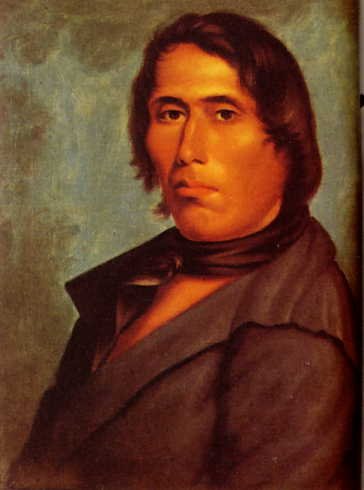Tecumseh was a Shawnee war chief who attempted to assemble a confederation of tribes to resist white settlement into the Ohio and Mississippi valleys in the early 1800s.
Early Life of Tecumseh:
 Tecumseh was most likely born in the spring of 1768, at a Shawnee village near what is now Springfield, Ohio. His father was killed at the Battle of Point Pleasant (in present day West Virginia) in late 1774, during a brief war between the Virginia militia and the Shawnee and other Indian tribes.
Tecumseh was most likely born in the spring of 1768, at a Shawnee village near what is now Springfield, Ohio. His father was killed at the Battle of Point Pleasant (in present day West Virginia) in late 1774, during a brief war between the Virginia militia and the Shawnee and other Indian tribes.
It is believed that Tecumseh’s mother fled westward, and Tecumseh and his brother were raised by an older sister. Tecumseh grew up to be a distinguished warrior in the Shawnee tribe.
Tecumseh’s Rise to Prominence:
With his tribe being pushed farther west by white settlers, Tecumseh became increasingly angry about the plight of his people. According to some accounts, he took part in many raids against whites on the frontier.
He became a chief of the Shawnee tribe, and led his people to settle near the banks of the Wabash River.
Tecumseh’s Brother Plays a Pivotal Role:
Tecumseh had a brother named Tenskwatawa who began having religious visions in the early 1800s. He thus became known as The Prophet.
Tecumseh and his brother founded a settlement (in present day Indiana) called Prophetstown (sometimes rendered as Prophet’s Town). Addressing visiting Indians from other tribes, Tecumseh and The Prophet would urge them not to drink alcohol, not to trade on credit with whites, and to work at developing their own agricultural skills so they could live as farmers.
Tecumseh’s Idea of an Indian Confederation:
Frustrated and offended by Indian tribes that sold land to whites, Tecumseh proposed that the tribes stick together. He wanted to form a confederation that would refuse to sell land to whites unless all the tribes agreed.
Tecumseh’s idea naturally brought him into conflict with the US government. The British in Canada, who were intent on thwarting American efforts to expand westward, gave support to Tecumseh’s efforts at forming a confederacy of Indian tribes.
Something that raised Tecumseh’s standing among the Indians is that he seemed able to predict events such as solar eclipses and earthquakes.
Tecumseh Confronts William Henry Harrison:
By 1810 Tecumseh was brought in direct confrontation with the governor of Indiana territory, the future president of the United States William Henry Harrison. (At that time, the Indiana territory included parts of present day Indiana, Illinois, Wisconsin, and Michigan.)
In August 1810 Tecumseh and Harrison met at what was called the Council of Vincennes, in Indiana. Tecumseh delivered an oration demanding Indian lands be returned, and what was to be a diplomatic meeting nearly turned violent.
Harrison and the Battle of Tippecanoe:
In 1811, Tecumseh traveled south to enlist more Indians into his confederacy. He warned his brother, The Prophet, not to be lured into open warfare with the whites, as the militia was too formidable a fighting force.
While Tecumseh was absent, William Henry Harrison led an attack against Prophetstown, the major Shawnee village. The settlement was destroyed. The Shawnee were later defeated by Harrisons’s forces at the Battle of Tippecanoe on November 7, 1811.
Decades later the name of the battle became part of the famous “Tippecanoe and Tyler Too” slogan for Harrison’s presidential campaign in the election of 1840.
The War of 1812:
When the War of 1812 broke out between the United States and Britain, Tecumseh took his followers and joined the British. He was appointed an officer, and participated in several battles, including the capture of Detroit.
Tecumseh was said to have saved some American prisoners at Detroit, and was generally respected by his American opponents as he did not believe in torturing captives and was known to keep his word.
Tecumseh Killed in the War of 1812:
When the British retreated into Canada in 1813, Tecumseh and his forces helped cover the retreat. The Indians under his command were overwhelmed by American troops, and Tecumseh was killed at the Battle of the Thames in Canada on October 5, 1813.
The troops that killed Tecumseh were under the command of William Henry Harrison, who had been named a general and put in command of the Army of the Northwest during the war.
Legacy of Tecumseh:
If Tecumseh’s idea of organizing the various Indian tribes to resist white settlement had succeeded, it would have seriously changed the course of American history. His political skills and charismatic leadership made him a revered figure.
Countless tributes to Tecumseh have appeared over the past two centuries, including the naming of towns and US Navy ships for him. A noteworthy Union general in the US Civil War, William Tecumseh Sherman, was given his middle name in honor of Tecumseh because his father respected the Shawnee chief.
Tecumseh’s Curse:
One quirk of history became known as “Tecumseh’s curse.” William Henry Harrison, whose life intertwined with Tecumseh, was elected president in 1840, caught a cold while delivering the longest inauguration address in history, and died a month later.
Superstition held that Tecumseh had cursed his old enemy Harrison, and people began to notice that since Harrison’s demise every American president elected in a year with a zero eventually died in office. The supposed curse held up until the term of John F. Kennedy, who was elected in 1960, and, of course, was assassinated in 1963.